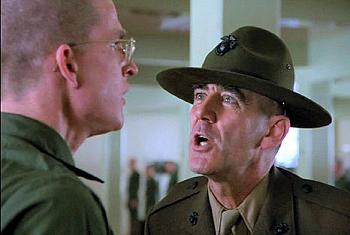Many call this the best war film ever, and they’re not totally wrong. I personally prefer the more lyrical approach of “Apocalypse Now”, but I was still amazed by the gritty realism of Stanley Kubrick’s film. One thing that can be disorienting is how the film seems to be a series of short films put together. That kind of storytelling worked extremely well for “The Deer Hunter”, but here it undermines the picture. It’s sometimes difficult to understand what links one set piece to the next, and the different parts of the film are uneven.
The first (and best) half follows a troop of young men has they go through boot camp under the tyrannical Sergeant Hartman (the riveting Lee Ermey), who wants them to become real US Marines, or more precisely cold-blooded killing machines. That first part of the film works exceptionally well. It almost feels like a documentary. Most of the grunts are anonymous, and we see isn’t commented. There is little dialogue, a lot is left unsaid, but we’re still disgusted by the thought of war just by what we witness. The drill sergeant does everything he can to destroy the spirits of the men under him, abusing them both verbally and physically. Subtly, Kubrick shows you the morally unacceptable way the army tries to rob soldiers of their humanity to make them better fighters. Slowly, the character that will take center-stage in the last half of the film emerge from the mass: he’s Private Joker (Matthew Modine ), a cynical man who actually wants to be a journalist. But this is not his hour yet, and the drama lies in the personal battle between the sergeant and Private Pyle (Vincent D’Onofrio), an overweight, clumsy guy who gradually turns into a mindless killer. But then, after events I wouldn’t dare reveal, the film shifts gear and loses most of the tension it had so carefully built.
We’re now in Nam and Kubrick tries to show us everything he can. There are scenes following Joker, who is now a war correspondent writing for the US army’s propaganda journal. You can see what Kubrick is aiming at, and he pinpoints the hypocrisy of the affair pretty well but then he forgets about it and tries something else. He shows us lighter scenes as the soldiers bond and throw macho bullshit at each other, while the soundtrack cries ironically various bubble gum tunes. There’s also amusing scenes involving a Vietnamese prostitute (“Me so horny!”). And of course, there are the combat scenes.
The main set piece has Joker and a troop of marines caught in a lethal showdown against a sniper. This is a well crafted scene, but it has little to say about anything and it certainly doesn’t have the intensity of the similar shoot-out that opens “Saving Private Ryan”. As for the climactic and highly cynical revelation (similar to the one that closes Orwell’s “1984”), it has worth by itself but it doesn’t redeem the film of its flaws. So like many of Kubrick’s films, “Full Metal Jacket” has the potential to be a masterpiece, but it’s ultimately not completely satisfying. A lot of the parts of the film are near-perfect ; too bad the sum of them isn’t quite as great.

